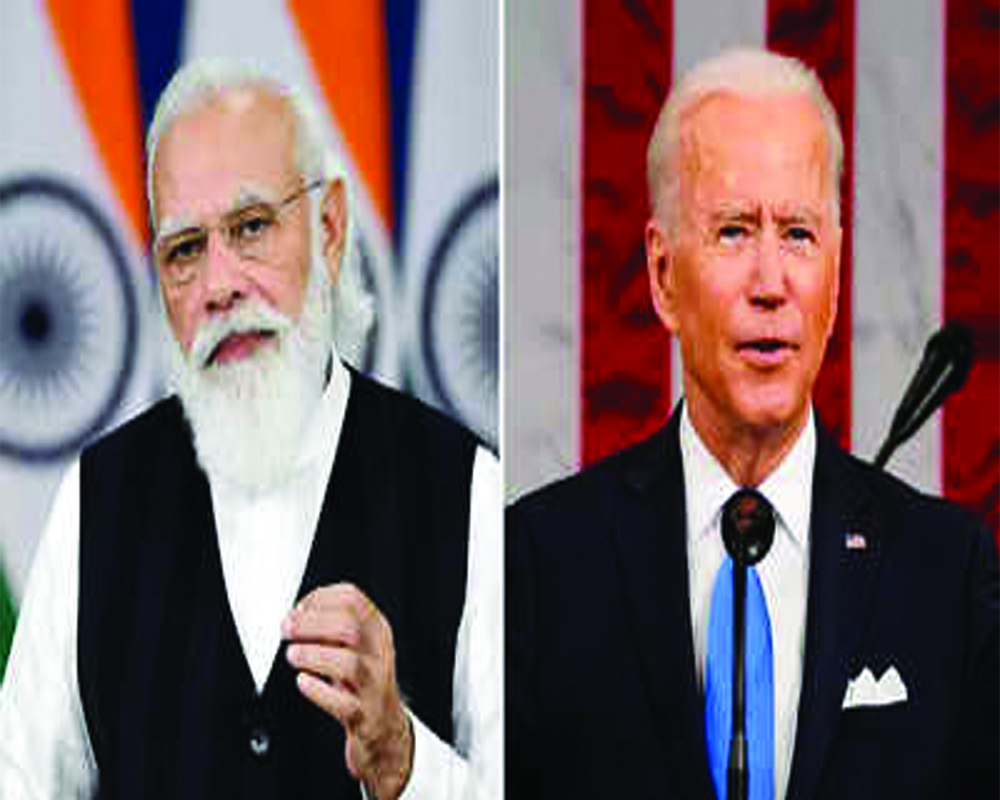India has a range of bilateral discussions lined up on current issues of interest
The United States is hosting the first in-person summit of QUAD leaders in Washington and perhaps beginning of a new era of cooperation on what the White House termed as “demonstration of the priority of engaging in the Indo-Pacific, including through new multilateral configurations designed to focus on 21st century challenges”. The centrality is the realigning of the partners' foreign policiesto Indo-Pacific coordination on shared targets. This roughly translates into keeping a sharp eye on Chinawhich is trying to defy international legal orders; therefore, a global consensus on the South China Sea is emerging. India's focus during the QUAD summit will be tackling the Covid-19 pandemic and future cooperation, climate change issues,and an open Indo-Pacific region that allows equal and fair access for nations to prosper. During the first, virtual meeting of the QUAD leaders in March, 2021, a commitment of one billion vaccines by 2022 was made. The leaders may also talk about additional relief and assistance measures for poor countries as a goodwill gesture. On the QUAD sidelines, a working group of senior representatives from member countries will focus on cyber security,secure supply chains infrastructure,and work towards finding a common language on emerging technologies including artificial intelligence. The global pandemic has ensured all digital economies around the globe, not to mention the QUAD members, need to find a common thread on defining paradigms for next-generation technology growth and collateral threats. The world industry facing acute shortage of semiconductor chips and other critical digital hardware components understand the importance of working with reliable trusted partners. United States, Australia, Japan and India are critical levers of the huge digital engine driving this technology towards a prosperity dream. One of the best outcomes from the QUAD summit could be for the leaders to come out with a paper on destinations and targets for this digital highway. This in itself could be one the key success stories for QUAD.
The last aspect on which most of the countries from the quadrilateral can make announcements would be on securing clean targets and achieving goals on climate change. The US envoy on climate John Kerry's visitto India a few days back was a firm commitment towards achieving time bound targets. The US offered assistanceto India for quickly reaching its renewable energy targets of 450 GW by 2030. Currently India's environment and climate change portfolio is held by ruling party heavy weight Bhupendra Yadav, who enjoysthe blessings of the senior leadership. The only challenge for India on this green path could be about assuming more green responsibilities at international forums while trying to attract investments. That is where the will of the domestic government and the organizational skills of the current minister will come for test. Finally on the sidelines of QUAD, Prime Minister Modi and his external affairs minister will hold a whole range of bilateral talks on current issues of interest. The India-US discussions and theoutcome notes would the most watched as this would be first in-person meeting between the President of the US and the Indian Prime Minister. Narendra Modi shared a visible sense of bonhomie with Joe Biden's predecessor Donald Trump. The same optics may not be repeated but Biden is unlikely to disappoint his counterpart. Afghanistan's safety, security and upholding of human rights in central Asia would definitely feature as key topics during the bilateral. The hurried exit of the US from Afghanistan has placed many fringe players such as India in a spot in the Central Asian theatre. Every major player in the region including China, Russia and Iranis trying to recalibrate its position with regard to Afghanistan.
(The writer is a policy analyst. The views expressed are personal.)


























